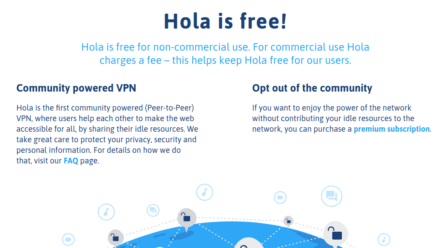Who is Hola?
Before anything else, it’s important to know that Hola is unlike other traditional VPN services. Instead of relying on dedicated servers to reroute your web traffic, Hola has what it refers to as a community-powered VPN. Essentially, what this means is that users’ traffic is rerouted through other users’ internet connections. This provides the benefit of masking your IP address, thereby allowing you to access geo-restricted content. But it also means that your system’s resources and internet connection are shared with the rest of the network. It’s an interesting (and rather unsettling) approach, to say the least.
Here is a brief overview of Hola services:
| Owned and Operated by | Hola |
| Year Launched | 2012 |
| Base of Operations | Israel |
| Operates in a Privacy-friendly Country? | No |
| Logging Policy | Keeps user logs |
| Encryption Used | (unclear) |
| Servers Located in | N/A |
Plans and Pricing
Hola is free for non-commercial use. Private individuals can use Hola indefinitely and on any number of devices. Users get access to all the features the service provides without any restricting limitations. The biggest drawback is that using the free service opens up your device to be used as a ‘peer’ in their network. To put it simply, you don’t pay with money, but with bandwidth and processing power. The only way to get around this is to purchase their premium service.
Hola Premium is advertised to come with several benefits. Upon further inspection however, it’s clear that the premium service has no distinct edge over the free plan. The only real advantage of paying for Hola premium is the promise that you will never be used as a peer on their network. That, and a 30 day money-back guarantee.
Below are the payment plans for Hola Premium. Payment options include credit cards (Visa, MasterCard, and American Express) and PayPal.
| One Month | $5.00/mo |
| One Year | $3.75/mo ($45.00 billed) |
Servers and Locations
Due to the nature of Hola services, users don’t connect through dedicated servers like on other VPNs. Instead, a worldwide network of peers serves as rerouting points for your internet traffic. In theory, this means that you should be able to connect from anywhere a peer is located. But in practice, it isn’t so great because these connections are unreliable and unsecure (more on this later).
Usability and Performance
Hola is extremely easy to install. If you’re accustomed to other VPN software however, you’ll notice that Hola operates a bit differently. It may be confusing at first, but its simplicity and lack of other features should allow you to figure it out in no time. Applications are clean, and beginner-friendly – featuring minimal functionality and easy navigation.
Internet speeds while using Hola services are relatively good. Users report minimal loss in bandwidth and are able to stream or download at pretty much the speeds they’d expect.
As for being able to unblock geo-restricted content, which is Hola’s main marketing point, sources indicate success for the most part. Users are able to access sites like Netflix, but don’t expect this to be the case all the time.
Security and Privacy
One of the biggest reasons to pay for a VPN service is the protection that it grants. Unfortunately, Hola fails in this regard. Tests indicate multiple data leaks even when connected to their network. No information on what kinds of encryption or protocols they use, if any, are available anywhere. Other features like a Kill Switch – common to most VPNs – are nowhere to be found, either.
Also, because of the P2P nature of Hola networks, other users’ unsavory internet activities may be associated with your IP address. This is dangerous as it could potentially put you at risk without you even knowing.
Hola’s privacy policy also clearly states that users’ data logs are in fact recorded. Your IP address and websites you visit, along with plenty of other information, are all logged for Hola to use as they see fit. It’s all very discouraging and simply defeats the purpose of having a VPN in the first place.
Supported Devices
The primary version of Hola functions as browser extensions for Chrome, Opera, and Firefox. There are Windows and Mac installers available for download on the official website, but these merely install the appropriate software needed to work in conjunction with your internet browser.
However, the Android and iOS versions work a bit differently. These versions are indeed standalone apps that run by launching your other apps through the Hola network. It’s a little clunky in practice and doesn’t always work right.
As for connectivity, since Hola doesn’t require users to sign in with an account, you can simultaneously connect any number of devices to their service.
Other Features
Hola’s main software has very limited functionality, but the company does offer a few privacy tools to complement their service. These include:
- Ad Blocker: This tool blocks annoying ads, malware, and trackers that may compromise your device and security.
- Accelerator: Claiming to increase streaming speeds, this tool promises to make videos load faster and with less buffering. However, users report no noticeable difference.
- GPS Location Spoofing: This tool is available on Android and changes your GPS location to anywhere you want.
Customer Support
Hola’s customer support is simply terrible. First, the website’s FAQ is outdated, difficult to navigate, contains conflicting information, and has plenty of typos. There is no live chat option. The only ways to contact support is by sending them an email and hoping that someone will eventually get back to you. They provide a fax and telephone number you can reach, but this is hardly an ideal route to take.
What's the Verdict on Hola?
Hola Review 2020 – Conclusion
If you’re looking for a simple tool that unblocks geo-restricted content, then Hola could be a decent choice if not for its security concerns. With little assurance of your data and bandwidth being protected and remaining private, it’s difficult to justify using this service even though it’s free to use.








No Comments... Yet!